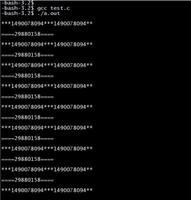C ++程序生成随机的十六进制字节
我们将讨论一个可以生成随机十六进制数的C ++程序。在这里,我们将使用rand()和itoa()函数来实现它们。让我们分别对这些功能进行分类讨论。
rand(): rand()函数是C ++的预定义方法。在<stdlib.h>头文件中声明。rand()用于生成一定范围内的随机数。这里min_n是随机数的最小范围,而max_n是随机数的最大范围。因此,rand()将返回min_n到(max_n – 1)之间的随机数,包括极限值。在这里,如果我们将下限和上限分别提到为1和100,那么rand()它将返回从1到(100 – 1)的值。即从1到99。
itoa(): 返回十进制或整数的转换值。它将值转换为具有指定基数的以空值终止的字符串。它将转换后的值存储到用户定义的数组中。
语法
itoa(new_n, Hexadec_n, 16);
这里new_n是任意随机整数,Hexadec_n是用户定义的数组,16是十六进制数的基数。这意味着将十进制或整数转换为十六进制数。
算法
BeginDeclare max_n to the integer datatype.
Initialize max_n = 100.
Declare min_n to the integer datatype.
Initialize min_n = 1.
Declare an array Hexadec_n to the character datatype.
Declare new_n to the integer datatype.
Declare i to the integer datatype.
for (i = 0; i < 5; i++)
new_n = ((rand() % (max_n + 1 - min_n)) + min_n)
Print “The random number is:”.
Print the value of new_n.
Call itoa(new_n, Hexadec_n, 16) method to
convert a random decimal number to hexadecimal number.
Print “Equivalent Hex Byte:”
Print the value of Hexadec_n.
End.
示例
#include<iostream>#include<conio.h>
#include<stdlib.h>
using namespace std;
int main(int argc, char **argv) {
int max_n = 100;
int min_n = 1;
char Hexadec_n[100];
int new_n;
int i;
for (i = 0; i < 5; i++) {
new_n = ((rand() % (max_n + 1 - min_n)) + min_n);
//rand()返回随机十进制数。
cout<<"The random number is: "<<new_n;
itoa(new_n, Hexadec_n, 16); //converts decimal number to Hexadecimal number.
cout << "\nEquivalent Hex Byte: "
<<Hexadec_n<<endl<<"\n";
}
return 0;
}
输出结果
The random number is: 42Equivalent Hex Byte: 2a
The random number is: 68
Equivalent Hex Byte: 44
The random number is: 35
Equivalent Hex Byte: 23
The random number is: 1
Equivalent Hex Byte: 1
The random number is: 70
Equivalent Hex Byte: 46
以上是 C ++程序生成随机的十六进制字节 的全部内容, 来源链接: utcz.com/z/360288.html





